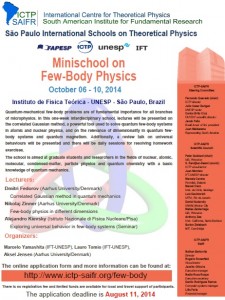Minischool on Few-Body Physics
Start time: October 6, 2014.
Ends on: October 10, 2014
Location: São Paulo, Brazil
Venue: IFT-UNESP
Organizers:
Marcelo Yamashita (IFT-UNESP), Lauro Tomio (IFT-UNESP) and Aksel Jensen (Aarhus University/Denmark).
Lecturers:
- Dmitri Fedorov (Aarhus University/Denmark) – Correlated Gaussian method in quantum mechanics
1) Variational method with with correlated Gaussians: basic concepts.
2) Optimization of the Gaussian basis: deterministic vs. stochastic approach.
3) Resonances with correlated Gaussians: strength function method and stabilization method.
4) Reactions and decays with correlated Gaussians: hyper-spherical method and resonating group method.
- Tobias Frederico (Instituto Tecnológico da Aeronáutica / Brazil) – Strongly interacting two- and three-boson systems between two and three-dimensions The dimensionality of the space strongly affects the properties of quantum bound states. One may theoretically and experimentally study the transition between different dimensions, which is a topic of recent interest in different fields of physics. We study the bound state spectrum of non-relativistic two and three boson systems when evolving from a three (3D) to a two-dimensional (2D) regime by squeezing one dimension with either open or periodic boundaries, such that the model interpolates between 3D and 2D limits. Our results show a distinct dimensional crossover as three-boson states will either disappear into the continuum or merge with a 2D counterpart, and also a series of sharp transitions in the ratios of three-body and two- body energies from being purely 2D to purely 3D and vice versa.
- Aksel Jensen (Aarhus University/Denmark) – Universal properties of few-body systems (Seminar – Document.pdf )
- Alejandro Kievsky (Istituto Nazionale di Fisica Nucleare/Pisa) – Exploring universal behavior in few-body systems (Seminar – Kievsky.pdf)
- Nikolaj Zinner (Aarhus University/Denmark) – Few-body physics in different dimensions
Few-body states for two particles are quite well-known from basic quantum mechanics class. There we learn that dimensionality is very important when trying to produce bound states of quantum particles. As we go beyond two particles the dimensional effects can become even stronger. In the course we will discuss some basic facts from quantum mechanics about bound states of two and three particles using simple examples as a guidance. We will then explore dimensional effects on the spectrum of bound states and the effects of quantum statistics. Finally, we will discuss how few-body bound states are embedded in a general many-body environment.
DOWNLOAD lectures I, II, III and Exercises
Description:
Quantum-mechanical few-body problems are of fundamental importance for all branches of microphysics. This subject has substantially broadened after the realization of Bose-Einstein condensation in cold-atom experiments (2001 Nobel Prize). In this one-week interdisciplinary school, lectures will be presented on the correlated Gaussian method, a powerful tool used to solve quantum few-body systems in atomic and nuclear physics, and on the relevance of dimensionality in quantum few-body systems and quantum magnetism. Additionally, a review talk on universal behaviours will be presented and there will be daily sessions for resolving homework exercises.
The school is aimed at graduate students and researchers in the fields of nuclear, atomic, molecular, condensed-matter, particle physics and quantum chemistry with a basic knowledge of quantum mechanics. There is no registration fee and limited funds are available for local and travel support of participants.
Application Deadline, August 15
Announcement
Programme: pdf programme_updated on October 7
| Start | End | From cold atoms to halo nuclei: minicourse on few-body phyisics | |||||
| MONDAY | TUESDAY | WEDNESDAY | THURSDAY | FRIDAY | |||
| 9:00 | 10:00 | REGISTRATION | |||||
| 10:00 | 12:00 | OPENING | Lecture II: D. Fedorov | Lecture III: D. Fedorov | Lecture II: N. Zinner | Lecture III: N. Zinner | |
| Seminar: A. Jensen | |||||||
| 12:00 | 14:00 | LUNCH | LUNCH | LUNCH | LUNCH | LUNCH | |
| 14:00 | 16:00 | Lecture I: D. Fedorov | Lecture I: N. Zinner | IFT-COLLOQUIUM: N. Zinner | Seminar: T. Frederico |
Seminar: A. Kievsky | |
| COFFEE BREAK | COFFEE BREAK | FINAL REMARKS | |||||
| 16:00 | 16:30 | COFFEE BREAK | COFFEE BREAK | ||||
| 16:30 | 18:30 | Activities: D. Fedorov | Activities: N. Zinner | Activities: D. Fedorov | Activities: N. Zinner | ||
| CLOSING PARTY | |||||||
List of Participants: Updated on Sept 18
General Information: General Information Sheet – Useful information specially for those who are not from São Paulo city.
Accommodation: Participants whose accommodation has been arranged and paid by the institute will stay at The Universe Flat. Each participant whose accommodation has been arranged by the institute has received the details about the accommodation individually by email.
Registration: ALL participants should register. The registration will be on October 6 from 9:00 to 9:50 at the institute. You can find arrival instruction at http://www.ictp-saifr.org/?page_id=195.
Upon registration, participants who are receiving financial support, please bring a photocopy of your ID or passport.
BOARDING PASS: All participants, whose travel has been provided or will be reimbursed by the institute, should bring the boarding pass upon registration, and collect an envelope to send the return boarding pass to the institute.
Emergency number: 9 8233 8671 (from São Paulo city); +55 11 9 8233 8671 (from abroad), 11 9 8233 8671 (from outside São Paulo).
Ground transportation instructions:
Ground transportation from Guarulhos Airport to The Universe Flat
Ground transportation from The Universe Flat to the institute
